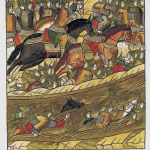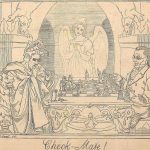Quotations
“His mind blunted by the cybernating drone in the distance, he leaned toward the console and put his head on his arms just as he’d done so many times first grade during the two-minute rest period every afternoon, nicks in the wooden desk, sleep pulling, chalk trails in the air. From a series of three dreams had evolved a life fulfilled in mathematics and philosophy. The dreams occurred within a single night. The first two concerned the terror of nature not understood and the last of them harbored a poem that pointed a way to the tasks of science. The world was comprehensible, a plane of equations, all knowledge able to be wielded, all nature controllable.”
…
“‘We can discover the truth or falsehood of our own final designs only if we teach ourselves to think as a single planetary mind. This is the purpose of Field Experiment Number One.’”
…
“‘Consider science itself. It used to be thought that the work of science would be completed in the very near future. This was, oh, the seventeenth century. It was just a matter of time before all knowledge was integrated and made available, all the inmost secrets pried open. This notion persisted for well over two hundred years. But the thing continues to expand. It grows and grows…’”
– Don DeLillo, Ratner’s Star, p. 64-65 (Billy and then LoQuadro)
An Excerpt
There are only two characters in the novel Ratner’s Star smarter than Billy and they are both on the far side of the borderland to what we call madness. There be dragons. Endor was the last man tasked to solve the alien message. He fails, and because he failed, he leaves the community of Field Experiment Number One, and moves into a hole of his own creation which he digs by the hour with the hook end of a clothes hanger. He can tell you about science…
Endor hasn’t completely abandoned his scientific roots, but he has started to butt up against things he doesn’t understand. And this fucks up his ability to carry on doing what he has always done, which is to do science, to use science to solve problems, explain things, come to conclusions. The alien transmission evaded his understanding. There was no math he knew that would unpack it. And so he went to live in a hole where he ate insect larva and dug himself deeper and ever deeper into the earth.
We will return to Endor but it is worth noting now that he is a thorough-going materialist. It should also be noted that the primary literary allusion for the name Endor is the biblical Witch of Endor from the Old Testament Book of Samuel. In the book, the king Saul hires the Witch of Endor to summon the dead prophet Samuel to read his future. She does and predicts that he and his three sons will all be killed in a battle with the Phillistines. And so they are, which introduces Philistinism—the quality of having no appreciation or understanding of culture or the arts. Although it’s a cultural reference twice removed, it seems applicable to Endor and the scientific culture that to which he belongs, and indeed , must belong else he loses his very sanity. What does this say about the scientific view of logic that to admit the existence of anything outside of science is to negate the mind itself, the methodology of reason, the rules of logic, and the ability to engage in rational thinking. But science is absolutist, a jealous god that will have no other god before it (nor suffer a witch to live).
Another Quote
“‘Mathematics is the only avant-garde remaining in the whole province of art. It’s pure art, lad. Art and science. Art, science, and language. Art as much as the art we once called art. ‘“
– Don DeLillo, Ratner’s Star, p.85, (Endor)
Use of quotations from DeLillo’s novel Ratner’s Star constitute fair use in this context– the analysis of a work of art.




